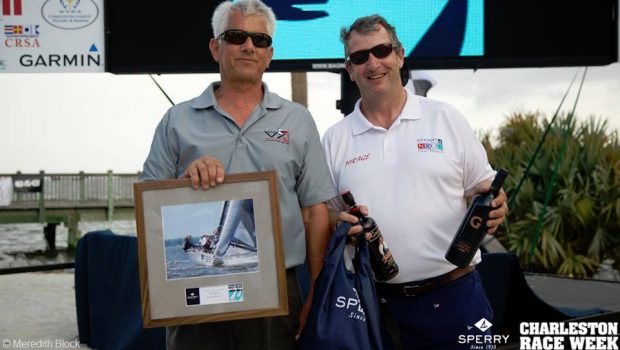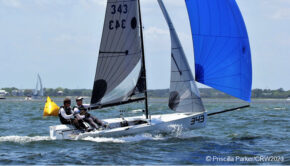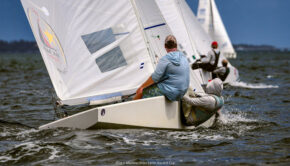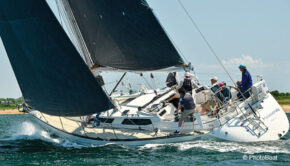Old Dogs, New Tricks
Published on May 9th, 2017
Cedric Lewis (above, right) grew up in Annapolis, MD and participated in the junior sailing program at Severn Sailing Association. Having owned several big boats over the years all named Mirage, including a J/29 and Mumm 30, his current boat is a J/105.
Now 52 years old, Cedric recently tried his hand at something much different when he raced for the first time on a VX One at Charleston Race Week. Here he tells the story…
I am now just 6 months removed from surviving a major heart attack called the widow maker. My friend, John Potter, called me a couple of months ago to check to see how I was doing, and as our conversation switched to sailing, he asked if I wanted to come and sail in Charleston.
He is trying to grow the fleet and help promote the boat, and after some consideration and plotting, we come up with the plan that John’s boat partner, Dave Guggenheim, would sail with Paul Curry in their regular boat and I would crew for John on a borrowed boat.
I have been feeling pretty good and I am always up for a new challenge, especially when it comes to sailing. But after hanging up the phone I was thinking to myself, “What did I just get myself into?” I had only sailed in the boat one time before and it was in only 5 knots.
I knew I needed to get some more time in the boat before getting to Charleston so I didn’t embarrass myself. Paul Murphy had just brought a boat to Annapolis, so I arranged to go out with Paul a couple of times to practice. After one more practice day on Thursday when I got to Charleston, I was as ready as I was going to be.
As Charleston Race Week got underway, Friday’s conditions were light in the morning but built up to 12 knots out of the SSW. I was still trying to figure out the boat and the current during the first race, but we managed to catch a couple shifts and were launched. It is a good thing too because downwind I felt like I spent the entire time on my backside in the bottom of the boat.
As the day went on I was getting better with my blow-through jibes but was still ending up too far forward in the boat. After three 5-leg races, the RC switched it up and gave us a 4-leg race with a downwind finish. Things were starting to click for us and I was starting to get a hang of it. In the last race of the day we lead from the start, and on the last leg I was having probably the best downwind of the day with good jibes and managing to stay back in the boat.
We were looking for the other end of the finish and realized we were about miss the finish. John quickly jibed but I was not ready and the boat quite literally went out from underneath me. I went over the side, clinging to the spinnaker sheet which kept me attached to the boat. I pulled myself back on board, sheeted in the spinnaker and we finished third. We ended the day with nine points, tied for 1st with Will Van Cleef and Marc Durlach. Whew!
We woke up on Saturday to a fresh breeze of 15 to 20 knots, conditions I was half dreading and half looking forward to. We seemed to be slightly out of phase in the first race and rounded the first mark at about mid-fleet. I was having trouble getting the chute up, and after several boats went past, I finally got it done and we took off screaming down wind. We passed a couple boats downwind and managed to do the same on the second downwind to claw our way back to 4th. We did much better and won the next two races … and then the wheels came off in last race.
Since it was forecast to blow up to 20 and we were in a borrowed boat, John decided to use one of his older jibs instead of the boat owner’s newer jib. We started the last race and on probably the second tack, the foot cord on the jib got caught on the cheek block on the bow. I went forward and cleared it but it did it again on the next tack. The jib is a deck sweeper and over the time the chafing had worn a hole in the foot to expose the foot cord.
The jib is self-tacking with one continuous line to trim sheet and adjust the car. Once the jib is sheeted in I typically only made minor adjustments to the car height. I came up with a solution to ease the sheet a couple of inches just before the tack to lift the foot up off the deck and then sheet back in after the tack. That got us to the weather mark but we were well behind at that point.
I had been struggling all day with the hoists. We originally thought the halyard was getting hung up on the spreader because I would get it up to a point and then it would hang up a few feet short of a full hoist. Then we would here a pop and then could pull it the rest of the way up.
On the last race the problem became apparent. There was no stopper knot on the belly cord and I pulled it through the grommet on the sail and this time it would release. It looked like we had an upper chute and lower chute pinched together by a couple of feet of line. At that point we threw in the towel and withdrew from racing. We headed back to the dock to exact repairs. With the drop we maintained a four point lead on Will.
The breeze was back down to 12 to 14 knots on Sunday, but on the first race we were fouled at the start and got away slowly. For the whole first beat, we were getting ping-ponged around the course with people tacking on us. We rounded the weather mark deep and needed to do some catching up if we wanted to remain in the hunt. Downwind was more of the same with boats jibing on top of us but we managed to claw back a couple of boats.
With the boats now spread out we were able to sail the shifts and made gains to weather. We rounded the weather mark and this time we got our chute up first and passed two more boats. We finished the race in 5th to maintain our lead over Van Cleef by two points heading into the final race.
We vowed not to repeat our mistakes from the first race and go out and win the final race. We got away clean at the start and we were able to sail our own race. We played the shifts while maintaining a loose cover on Will and we rounded in first place. We managed to connect the dots downwind going from puff to puff. The second beat we did the same thing, playing the shifts while keeping track of #154. We again rounded the top mark in the lead and took it home for the overall victory.
What did I learn? For starters, I am not in as good of shape as I thought I was. I have been sailing big boats for too long and hiking like that, especially on Saturday, was challenging. I was fortunate that the boat we were sailing had a hiking line to hold on to which did help with the abs. But as the races added up I slowed down.
Upwind I did my best to look around and call puffs and shifts and report on the other boats, but everything speeds up ten-fold sailing downwind. I had my hands full with absolutely no time to look around. The speed of these boats off the wind is mind boggling! One false move on my part and we drop off a plane and four boats go whizzing by. The boats are much more tactical downwind than the boats I am use to sailing. You sail at much hotter angles to get the boat planning. The hotter angles also means the jibes are reach to reach.
The VX sailors are a tight knit group willing to step in and help each other out. This was apparent when Peter Gamble broke his rudder on Saturday. Everyone jumped in to help make the repairs and get him back on the water on Sunday. The class is full of great sailors willing to share knowledge. They recognize that building the class means helping along the back of the pack sailors. It will only make the class stronger as a whole to keep these boats involved.
I never got a max speed reading going downwind on Saturday but I am guessing we were at about 17 knots which is the fastest I have gone in a monohull since my Mumm 30. And unlike my Mumm 30, I felt like the VX One was in complete control the whole time. I had an absolute blast sailing these boats and Charleston is an ideal sailing venue. The conditions could not have been better and I plan to be back next year … hopefully in my own VX One.









 We’ll keep your information safe.
We’ll keep your information safe.